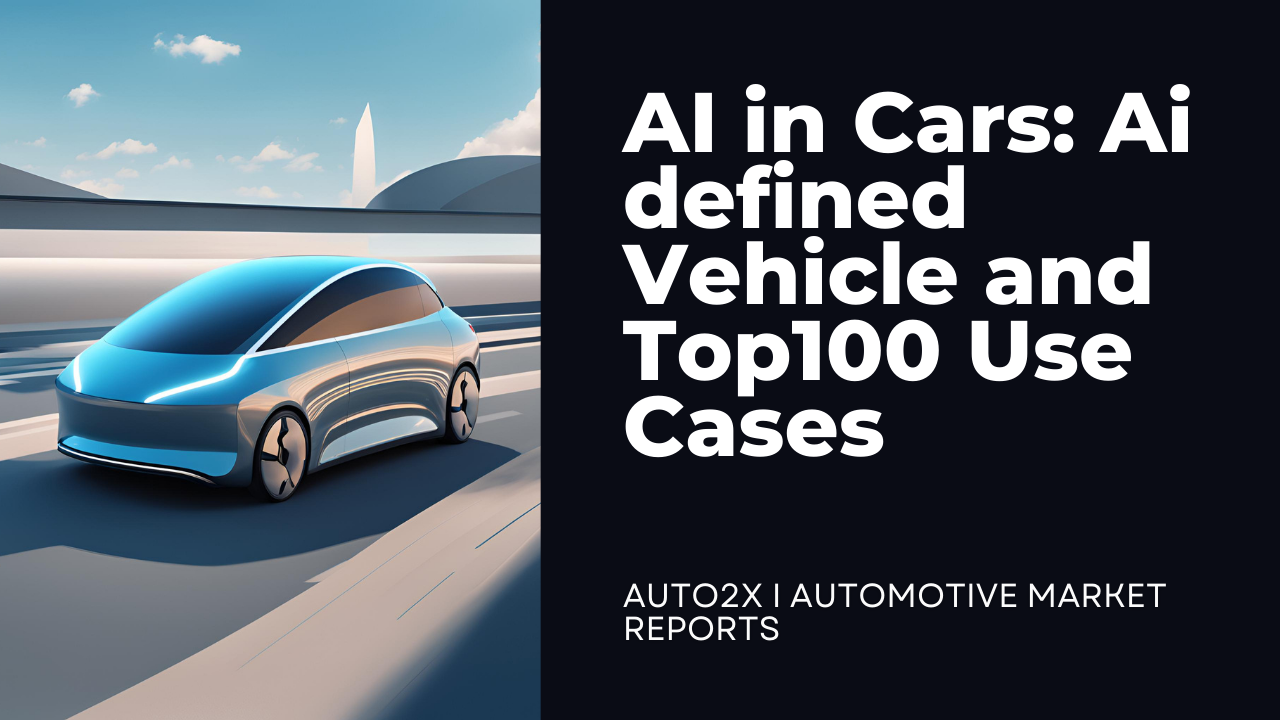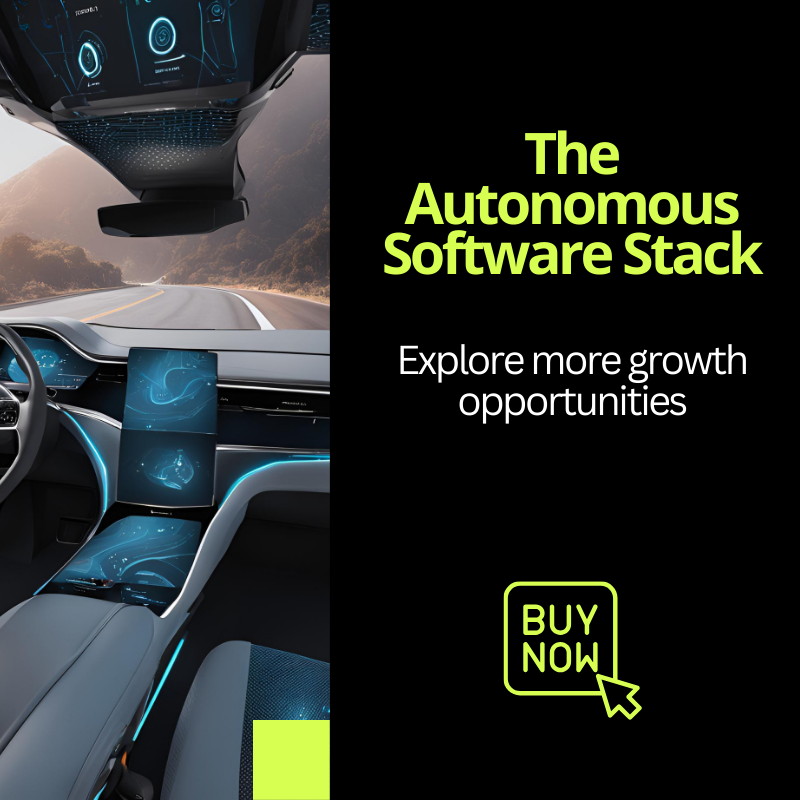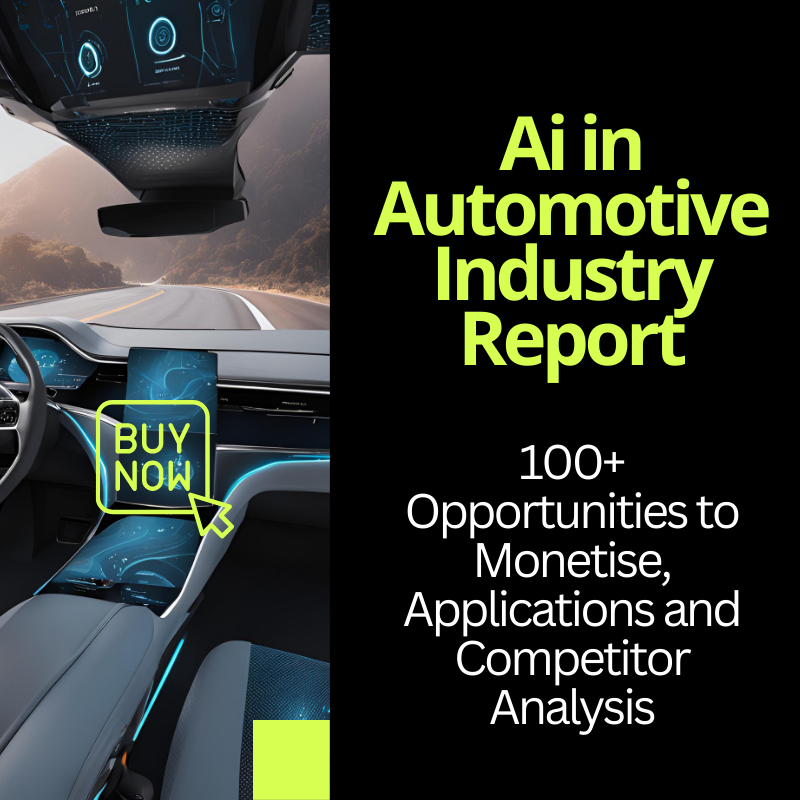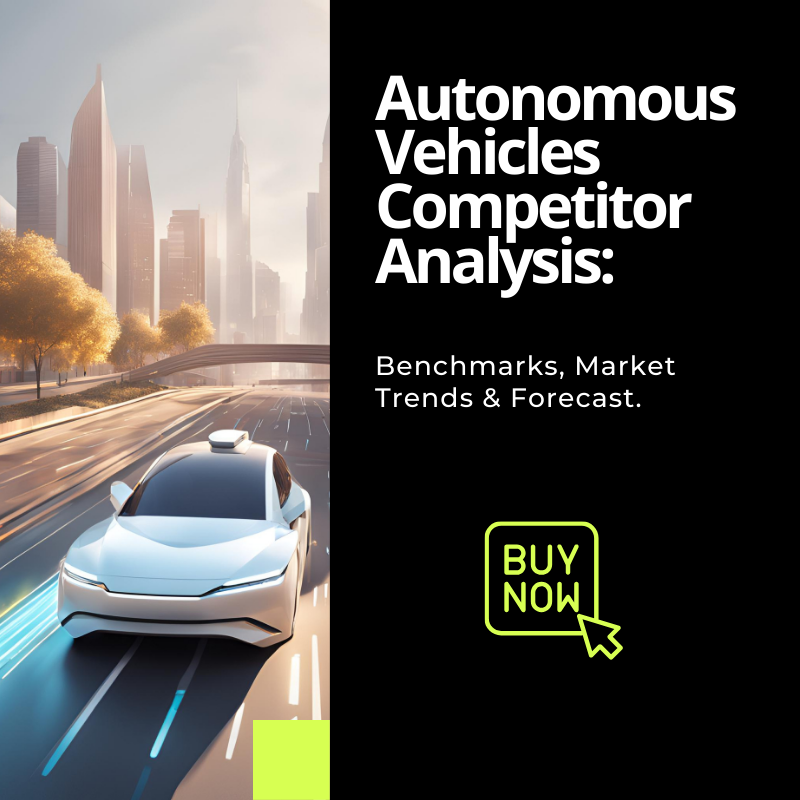Your basket is currently empty!
AI in Cars: Ai defined Vehicle and Top100 Use Cases
We are here to help! Contact us for custom research or automotive technology databases.
Posted by:
Published:

The AI defined vehicle represents the culmination of decades of innovation in AI, generative design, machine learning, and robotics.
Players are concentrating efforts on AI integration across the vehicle lifecycle—design, production, operation, and customer support.
Auto2x analysed more than 100 applications of AI in cars to unveil strategic opportunities, and advise stakeholders on the technological readiness and value extraction of different use cases.
The insights come from our latest report: AI in Automotive: Opportunities, Applications and Competitor Analysis1
Real-World Integration of AI in Cars
We analysed more than 100 use cases of Artificial Intelligence in Automotive to understand:
- Which automotive applications of AI are gaining traction in 2024-25 and why?
- Which tech enablers do players use, e.g. GenAI, NLP, ML or acoustic AI?
- Which domain is it for, e.g. HMI in-car assistants, Level 4-Autonomous driving, vehicle design or manufacturing?
- Who are the partners enabling the tech integration, e.g. Amazon, Baidu. For example, NVIDIA is a key supplier of Generative AI for AI brain for autonomous driving
Navigate our database of AI use cases and enabling technologies in the automotive industry to learn about strategies and emerging trends.
To access the full database contact us here.
Exploring Generative AI Applications Beyond Voice Assistants
The VW Group, Stellantis, and Great Wall Motors are among the carmakers integrating Generative AI to in-car voice assistants to make communication between the driver and the system more accurate.
However, an interesting angle is to look at who supplies the technology at a regional level. In China, Baidu has a strong position compared to Cerence or OpenAI’s ChatGPT.
3 Chinese Players to Watch in LLMs in Autonomous Driving
Three Chinese players show how they have developed solutions for Autonomous Driving using large-scale models and often a vision-only approach.
- Haomo.ai with DriveGPT an autonomous driving generative large-scale model aiming at end-to-end self-driving cognition.
- Baidu, Inc. with their Level 4 Apollo Self Drive (ASD) and an end-to-end large-scale model
- Waabi in Autonomous Trucks. In March 2024, Waabi introduced their Copilot4D: A Foundation Model for Self-Driving. The integration of generative AI into Copilot4D enables it to learn from vast amounts of sensor data without requiring extensive human supervision. This is pivotal for scaling autonomous driving technologies effectively and safely.
Design and manufacturing
In terms of design, the benefit of using generative AI is leveraging the different types of iterations in a simulated environment to optimize resources and allow for better efficiency when you design a component or even a whole vehicle.
With regards to manufacturing, there are a lot of benefits to bringing elements of sustainability, such as the collaboration of Aston Martin with Provider Altair to create efficiency and sustainability.
The Key Pillars of the AI defined Vehicle
Unlike traditional vehicles defined by mechanical components and hardware, AI-defined vehicles are dynamic, software-centric platforms.
The AI defined vehicle represents the culmination of decades of innovation in AI, generative design, machine learning, and robotics. It continuously evolves delivering unparalleled safety, efficiency, and user experiences.
XPeng claims their P7+ is the world’s first “Ai defined vehicle2” featuring built-in AI-powered advanced ADAS, XPENG’s in-house XOS 5.4 and the AI Hawkeye Visual Solution.
The road ahead for AI in cars requires a unified effort across industries to overcome challenges and drive adoption at scale.
Generative AI Design
The adoption of Generative AI Design in the Automotive industry is growing fast to leverage its benefits for iterative efficiency and optimize solutions based on aesthetics, lightweight, aerodynamic and energy-efficient components.
Volkswagen harnesses generative AI to optimize the design of its Golf hatchback, generating numerous design options for the chassis, leading to a more lightweight and fuel-efficient vehicle.
Sustainable Production
AI plays a pivotal role in making the automotive industry more sustainable across the vehicle lifecycle.
- Machine Learning (ML) and Predictive Analytics are popular for predictive maintenance, error identification, and infrastructure monitoring.AI enhances robot manufacturing efficiency and reduces production downtime
- Battery Optimization: Machine learning can help optimize battery cell production
- AI in Supply Chain Monitoring ensures transparent, sustainable procurement of materials, reducing carbon footprints.
Online AI Car Configurators and Metaverse
Carmakers like Rimac are already working on future car configurators with interactive personalization using Generative AI and real-time graphics.
Fiat has launched their Metaverse Store, a virtual dealership that covers every stage of the buying journey, from discovery to configuration and purchase.
AI Brain Vehicle Computer: The Nerve Center of Driverless Vehicles
The AI brain vehicle computer is the central processing unit, enabling vehicles to think, learn, and adapt over time. For EVs and autonomous vehicles, it provides the intelligence needed to meet the growing demand for smarter, greener, and more adaptable vehicles.
It combines inputs from multiple vehicle systems (e.g., navigation, sensors, user preferences) for more informed decision-making. In ADAS, AI brain computers process data from cameras, sensors, LIDAR, and RADAR in real-time, enabling autonomous driving functionalities (e.g., lane keeping, obstacle avoidance).
Continuous Learning with SDV-SOTA
Unlike traditional vehicles that degrade over time, Software-defined vehicles improve with each software update, offering new features and optimized performance.
The heart of AI defined Vehicle: Safety & Autonomous Driving
Autonomous driving technology is at the heart of the AI-defined vehicle. AI-driven systems reduce human error and enhance situational awareness.
- Computer Vision helps interpret road conditions, obstacles, and signals with precision.
- Edge AI allows real-time decision-making by processing data locally, reducing latency. Companies like Aptiv and Bosch are adopting edge computing to process data locally, reducing latency and dependence on cloud systems.
- Acoustic AI detects emergency vehicles and ambient noises, adding a layer of situational awareness. Cerence is supplying BMW’s L3 with emergency vehicle detection
Collaborative AI and V2X For Perception Beyond The Range of Sensors
Integrating Vehicle-to-Everything (V2X) communication enables vehicles to communicate with traffic infrastructure and other cars, paving the way for smart cities.
ZF is exploring collaborative AI models to enhance vehicle-to-vehicle interaction, particularly in dense traffic scenarios.
Ai defined vehicle for Advanced Electrification
AI in Electric vehicles is following a strong growth trajectory with innovations focused on energy management, personalisation and sustainability.
- Route Optimization: AI optimizes route planning for EVs, considering traffic, terrain, and weather to reduce energy consumption.
- Battery Performance: AI is used to optimize battery cell production and predict battery health for efficient energy usage. Predictive analytics helps with proactive maintenance and extending battery life.
- AI in-car voice assistants to help EV drivers drive more efficiently.
UX: Predictive Personalization and Vehicle Companions
Natural language processing (NLP) makes the car a true digital companion.
- In-car Assistants: Voice-enabled AI assistants help drivers navigate, optimize routes, and even manage energy consumption in electric vehicles (EVs).
- Digital Cockpits: Generative AI enhances in-car interfaces by providing predictive suggestions and personalized content.
Emotion AI to Prevent Driver Distraction & Health Emergencies
Safety is enhanced through Emotion AI, which monitors driver behaviour and state of mind:
- Real-time emotion recognition detects fatigue or distraction, triggering alerts or interventions to ensure safety.
- AI-based monitoring of surrounding vehicles and infrastructure enables predictive analytics to prevent accidents.
Efficiency Optimization During the Whole Vehicle LifeCycle
Analyzing vehicle health data systems can minimize downtime and ensure efficient energy use, particularly critical for electric vehicles (EVs). This real-time optimization helps companies manage costs and reduce carbon footprints while improving operational efficiency.
AI-Driven Maintenance and Repairs
- Robots and AI systems monitor production lines to identify trends in errors.
- Gen AI Mechanics-Acoustic AI for Quality Inspection in Production
- Natural Language Processing in Technical Customer Service
- In-field diagnostics analyze vehicle conditions, enabling proactive repairs before critical failures occur.
End of Life: Automated Dismantling, Recycling, Repurposing
By integrating AI into dismantling, recycling, and repurposing processes, the automotive industry can reduce waste, recover valuable materials, and contribute to a circular economy while minimizing environmental impact.
- AI-powered computer vision systems can identify and sort vehicle components for dismantling, and separating materials like metals, plastics, and electronic parts.
- AI evaluates the condition of components such as EV batteries to determine if they can be repurposed for energy storage in homes, businesses, or grid applications.
Questions? We’re here to help! Contact us for custom research or automotive technology databases.
Want to Track the Latest Trends in Automotive?
- Discover 200+ opportunities,
- Explore 2000+ technologies,
- Connect with 3000+ companies.
Product Search
Use this search box to quickly find the most relevant products.
About us
Auto2x is a London-based market research firm specializing in the automotive sector. We deliver in-depth insights and analysis on industry trends, emerging technologies, and market dynamics, helping businesses stay ahead in the evolving automotive landscape.

Want to Track the Latest Trends?
- Discover 200+ opportunities,
- Explore 2000+ technologies,
- Connect with 3000+ companies.


